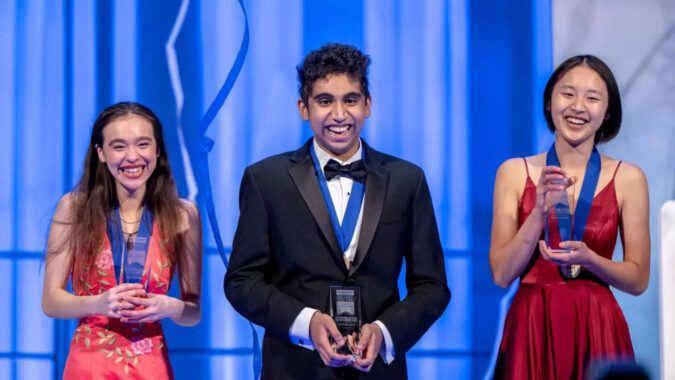WASHINGTON: An Indian-American teen from Michigan has won the prestigious science talent search award for high school students in the United States.
Neel Moudgal, 17, of Saline, Michigan, will receive the USD 250,000 award in the 2023 Regeneron Science Talent Search for creating a computer model that can rapidly and reliably predict the structure of ribonucleic acid (RNA) molecules using only easily accessible data.
He believes it will make it easier to diagnose and treat certain diseases.
It is the oldest and most prestigious science and maths competition for high school seniors in the United States.
According to a statement, Neel’s computational model contains a library of possible shapes for a given RNA molecule based on its atomic structure. A statistical method assigns weights to each structure in the library, favouring structures that closely resemble experimental data. By using 2D histograms for reweighting, his model eliminates the need to assign chemical shift data.
As many as 40 finalists, including Neel, were honoured during a live-streamed award ceremony emceed by American Broadcaster Soledad O’Brien. More than USD 1.8 million was awarded to the finalists, who were evaluated based on their projects’ scientific rigour, their exceptional problem-solving abilities and their potential to become leaders in STEM.
Second place and USD 1,75,000 went to Emily Ocasio, 18, of Fairfax, Virginia, who used artificial intelligence to determine whether humanising language was used by the Boston Globe in the years spanning 1976-84 when describing homicide victims. She found that Black victims received less humanising coverage than white victims.
Third place and USD 1,50,000 went to Ellen Xu, 17, of San Diego, California, for developing an algorithm that uses a smartphone photo of the patient to aid in the diagnosis of Kawasaki disease, the leading cause of acquired heart disease in children between one and five.
“Congratulations to the winners of the Regeneron Science Talent Search 2023,” said Maya Ajmera, president and CEO of the Society for Science and Executive Publisher of Science News.
“These young leaders are the stewards of our future. I am in awe of their creativity and conviction,” she said.
Neel Moudgal, 17, of Saline, Michigan, will receive the USD 250,000 award in the 2023 Regeneron Science Talent Search for creating a computer model that can rapidly and reliably predict the structure of ribonucleic acid (RNA) molecules using only easily accessible data.
He believes it will make it easier to diagnose and treat certain diseases.
It is the oldest and most prestigious science and maths competition for high school seniors in the United States.
According to a statement, Neel’s computational model contains a library of possible shapes for a given RNA molecule based on its atomic structure. A statistical method assigns weights to each structure in the library, favouring structures that closely resemble experimental data. By using 2D histograms for reweighting, his model eliminates the need to assign chemical shift data.
As many as 40 finalists, including Neel, were honoured during a live-streamed award ceremony emceed by American Broadcaster Soledad O’Brien. More than USD 1.8 million was awarded to the finalists, who were evaluated based on their projects’ scientific rigour, their exceptional problem-solving abilities and their potential to become leaders in STEM.
Second place and USD 1,75,000 went to Emily Ocasio, 18, of Fairfax, Virginia, who used artificial intelligence to determine whether humanising language was used by the Boston Globe in the years spanning 1976-84 when describing homicide victims. She found that Black victims received less humanising coverage than white victims.
Third place and USD 1,50,000 went to Ellen Xu, 17, of San Diego, California, for developing an algorithm that uses a smartphone photo of the patient to aid in the diagnosis of Kawasaki disease, the leading cause of acquired heart disease in children between one and five.
“Congratulations to the winners of the Regeneron Science Talent Search 2023,” said Maya Ajmera, president and CEO of the Society for Science and Executive Publisher of Science News.
“These young leaders are the stewards of our future. I am in awe of their creativity and conviction,” she said.
